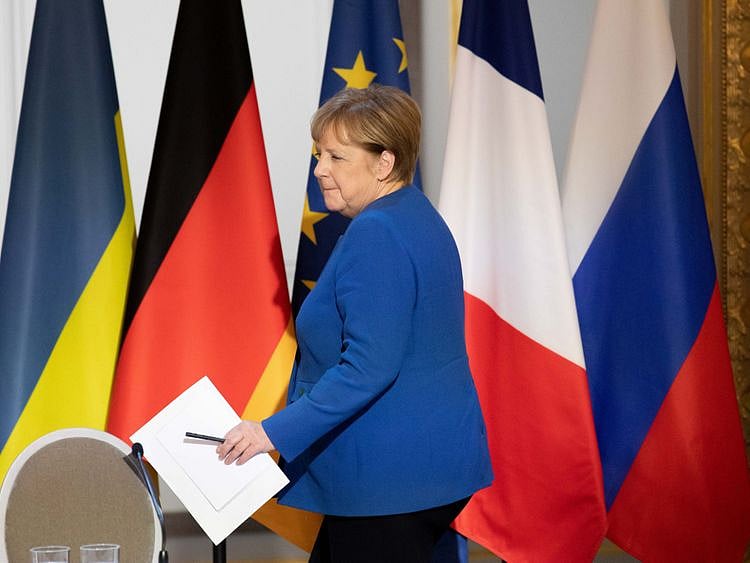Here is why Germany has less political instability
Social Democrats didn’t quit their loathed coalition with Merkel for obvious reasons

What a way to climb down. And how very German. Having promised revolution one week, Germany’s Social Democrats called it off the next, hoping that nobody would take much notice.
As so often in contemporary German politics, rupture was averted for the sake of stability, open conflict exchanged for suppressed frustration, movement foregone for stasis.
So the Social Democrats were dead set on quitting their loathed coalition with Chancellor Angela Merkel’s conservative bloc, after electing two leaders who had promised exactly that. Germany was to get a new government. The SPD would retreat into opposition to lick its wounds and regain its ideological purity.
But that fervour soon dissipated. The new co-leaders, Saskia Esken and Norbert Walter-Borjans, have miraculously turned from leftist firebrands into meek functionaries. Instead of reading their coalition partners the riot act, they’re merely suggesting policy tweaks — a higher minimum wage, more public investment, that sort of thing.
The SPD, a party that’s out of date and out of ideas, never wanted to be in another “grand coalition” with Germany’s centre-right bloc, the fourth in postwar history and the third under Merkel. But in early 2018 it dutifully obliged, after all other coalition options fell apart. It was one of their own, President Frank-Walter Steinmeier, who pushed them into it.
Culture of consensus
He did this by giving everyone a good talking to about “stability”. Europe’s smaller countries (Belgium, say) may occasionally abide hung parliaments or minority governments, or keep calling snap elections. But for the continent’s largest economy, such volatility just won’t do. Esken and Walter-Borjans have been hearing something similar from their party elders all week.
This reflex to pull back from the brink is also rooted in German history. The country’s acute fear of instability dates to the Weimar Republic, when parliament seated an average of 14 parties and governing coalitions were as steady as Hollywood marriages.
The distrust of passion in politics, which Germans tend to decry as demagoguery, comes from what followed Weimar.
Voters of a certain age recoil at the sort of soaring oratory or verbal attacks that would be considered quotidian in Washington or London. “Because of Hitler, the palette of contemporary German political rhetoric is deliberately narrow, cautious and boring,” thinks Timothy Garton Ash, a British historian who’s been watching Germany for decades.
At a time when the US, Britain and other countries seem paralysed by polarisation, this culture of consensus and moderation would appear to be a strength.
What the SPD did is certainly the norm. Last year, the outside world worried that Merkel’s government would topple over a bitter dispute between her and the interior minister; then, just like that, they were all smiles again.
In seven decades of postwar democracy, there has been precisely one palace coup (in 1982), and it hardly made a difference to policy. As recently as 2015, 81 per cent of Germans considered stability to be a national strength.
In a new poll, however, only 57 per cent had that opinion, partly because the costs of this consensual culture are becoming clearer.
Lost dynamism
One side effect is that excessive centrism strengthens the political fringes. As the mainstream gets blurred in a haze of compromise, centre-left and centre-right become indistinguishable to ordinary voters. Frustrated by the absence of clear choices, many turn to radicals and populists.
In the latest polls, Christian Democrats and Social Democrats together have 38 per cent ; the far-right Alternative for Germany and the far-left Linke jointly get 27 per cent.
A subtler cost of too much compromise is that it leads to small thinking and lost dynamism. In 14 years under Merkel, Germany hasn’t enacted any major economic reform. It has helped manage international crises, but hasn’t dared to formulate a vision for either the euro area or the European Union.
The conservatives in the coalition block fiscal stimulus or a Euro-area deposit insurance scheme; the Social Democrats baulk at higher defence spending. And so on.
At a time of accelerating change, the establishment thus appears to be calcified. Automation and artificial intelligence will disrupt labour markets and threaten Germany’s vaunted ‘Mittelstand’ firms in manufacturing.
Geopolitically, the EU risks being squeezed between an unpredictable US and a rising China. But Germany’s government keeps bickering about small beer.
Stability is better than chaos and strife. But if it becomes complacency and stagnation, it holds a country back. If that country is the largest in the EU, that’s a big problem for the whole continent.
— Bloomberg
Andreas Kluth is a political columnist. He was previously editor in chief of Handelsblatt Global and a writer for the Economist.
Network Links
GN StoreDownload our app
© Al Nisr Publishing LLC 2026. All rights reserved.